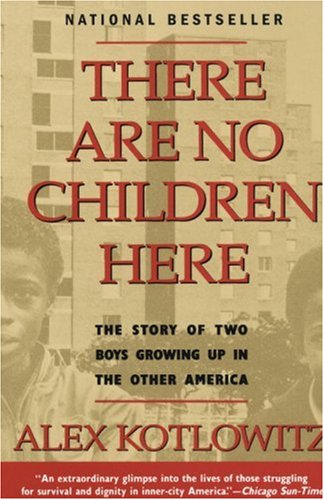
In the late 1980's journalist Alex Kotlowitz researched one of the great stories of urban depression in our time. He befriended a family in Chicago's Henry Horner homes (HHH), the 'projects' or 'jects' as they were called. Along with other urban projects, the HHH were built in the late 1950s as a response to homelessness. They seemed nice when they were built but became run-down, gang and drug ridden, a neighborhood that police didn't even want to enter.
There Are No Children Here is the story of Lafeyette and Pharoah Rivers and their family, consisting of mother LaJoe, drug-abusing father Paul, their younger triplet siblings, their 3 older teen/adult siblings and a host of friends and family that pass through their first floor apartment of the HHH. Their apartment where the scalding hot water in the bathtub never turns off. Where there are no closet doors or proper beds. Where appliances break and never get fixed. Where they must run to the hallway to escape from gunfire. From where their mother looks for a job and cannot get hired. Where the only people that appear to be financially stable are involved with drugs and gangs.

This is the story of Lafeyette and Pharoah, boys of age 9 and 12, who are not, as the title suggests, children, for they have seen far too much to still have the minds and hearts of children. These boys see their own mortality at their young ages as they attend the funerals of young friends and neighbors. These boys have a bit of an escape in school, where Pharoah thrives, in a neighborhood that most people wouldn't drive though, their teachers leave valuables at home and hope for the best.
This is the story of life in the Chicago projects. It is not pretty. We do not want to believe that this goes on only blocks from where we live. We do not want to believe that children struggle so.
This is a difficult book to read, as my bookclub found when we discussed this book on Monday night. I veer from sadness to frustration to anger at this cycle that perpetuates itself. How badly these boys and their mother want to be 'normal' and live in a 'normal' home in a 'normal' neighborhood.
The fact that this book exists, that Kotlowitz got this story in the first place is truly amazing. The Henry Horner Homes are gone now, demolished along with other high rise projects. That does not make this story any less timely or important.
Above photo taken by Stephen Shames

9 comments:
I think you are so right - we do not want to believe that happens in our country.
I saw a documentary on the working poor once. I am having trouble remembering the title but basically, much of the population is only one paycheck away from being homeless and many are homeless only because they do not have enough for the first and last deposit on an apartment.
It's devastating to think that people work, yet could still be homeless and then if they have children, that further complicates the matter because of daycare costs, etc.
I am guessing that if someone really delved into poverty here in the U.S., there would be a lot more stories like these.
If you want to read a very upbeat book about poverty and more importantly, ending poverty, check out Banker To The Poor by Mohammad Yunus. He won the Nobel prize. Here is the link to my review of the book:
http://bookchatterandotherstuff.blogspot.com/2008/03/banker-to-poor.html
It's hard to believe that so many people still live in these horrible conditions isn't it?
Thank you for mentioning this book Tara. I'd not heard of it but it sounds like an informative and important read.
Ah dang, Tara! Now I want to read this one. Why did you have to go and do that to me?
Bermudaonion, it's hard to imagine, I think, for people who never see it..but it's there.
Ti, it is devastating. Our church runs a program one month each year and homeless families spend the night in the chuch. They have the same sort of stories you're talking about, being one paycheck away from being homeless. Thanks for the book suggestion. I'll check it out.
Iliana, I think it is an important book, and sheds some light on what is difficult for us to understand, that is, how things became so bad.
Natasha, oh good! I hope you do read this one. I think you would also enjoy Random Family by Adrien LeBlanc.
Books like this are hard to read but important to read, too.
Marie, I think so too.
I read this book about a year ago and it had a huge impact on me. Like you, I was appalled that "children" lived in this type of environment - knowing that it was true, but not thinking about it daily. Reading a book like this reminds us to really look around us, outside our daily lives, and do what we can to help or raise the issues.
LibrarysCat
Hi Library cat, thanks for stopping by. You're so right - sometimes we do need to remind ourselves that we're pretty lucky.
Post a Comment